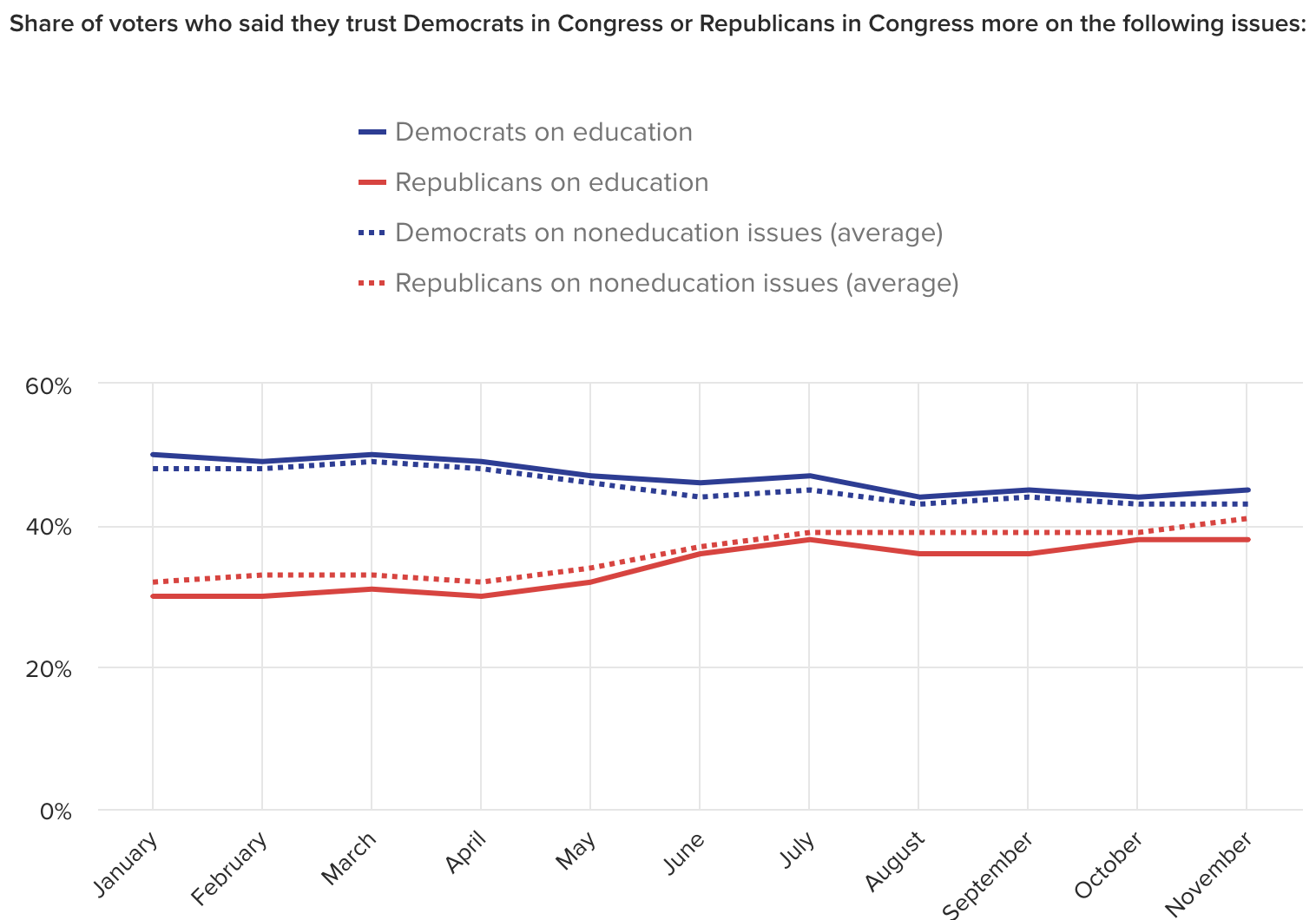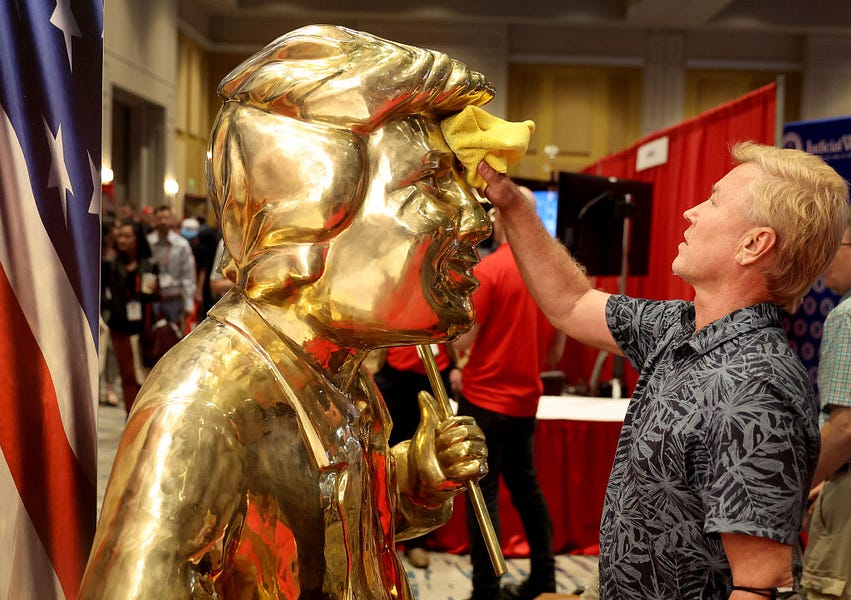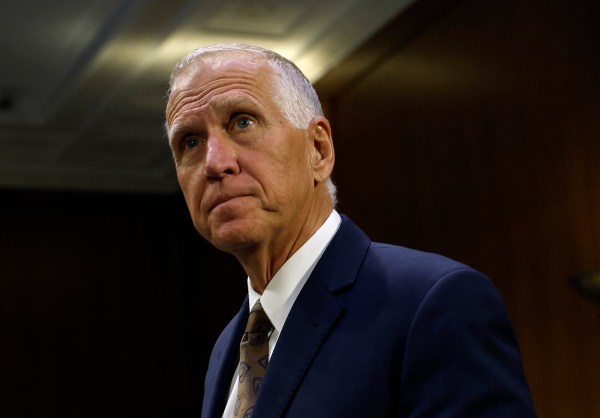Campaign Quick Hits
To Debate or Not to Debate: Four Republican candidates faced off last week at Villanova University for the first televised GOP primary debate in Pennsylvania. Noticeably absent from the debate were the two highest-profile GOP candidates in the race: David McCormick—a former Bridgewater CEO—and television personality Mehmet “Dr. Oz” Oz.
One of the GOP candidates who did show up made the most of the opportunity: “I’m gonna wave to all of our friends at home, including Dave McCormick and Mehmet Oz,” businessman Jeff Bartos said.
Oz had told the hosts he had a scheduling conflict, while McCormick’s campaign implied last week that no debate is worth attending without his main primary challenger. “Dave is looking forward to debating. Hopefully Mehmet will confirm a day and time soon,” McCormick campaign spokesperson Jess Szymanski told The Dispatch last week. Carla Sands, former U.S. ambassador to Denmark under the Trump administration, also declined to participate in last week’s debate.
So why not show up? Let’s flip the question. Who watches a Senate debate and why does it matter? The answer to the first question is … mostly reporters and voters who have already decided who they support. You’d almost certainly be better off going on Fox News—even if 96 percent of those viewers can’t vote in your primary. Four percent of 3 million is still larger than the debate audience. And that answers the second question. If you’ve already got sky-high name ID or are the clear frontrunner, there’s not much upside and the downside is giving a bunch of reporters the chance to dunk on you. Especially if your potential weakness is that you’re not particularly fluent in a lot of current political topics like debt reduction, tax structure, NATO membership, etc.
Okay, so what about the No. 2 guy? If the No. 1 guy doesn’t show up, the debate risks looking like the kiddie table. Plus, debates require prep time. So if there’s no particular upside, then why take away time from your other priorities?
Education Threatens Democratic Governors: Virginia Gov. Glenn Youngkin’s surprise victory last November provided a perfect blueprint for prospective Republican gubernatorial candidates: Focus on K-12 education and try to ignore all the Trump stuff. GOP gubernatorial hopefuls have taken note, and are zeroing in on mask mandates, school closures, and critical race theory to appeal to parents of school-aged children. Not only did it turn out GOP voters in droves, but there’s some evidence it even flipped some Biden voters in the state.
Youngkin performed a rare feat in partisan politics: He took his opponent’s strength and successfully made it his weakness. Democrats have run ahead with voters on education since … forever. Fifteen years ago, they had a 23-point advantage on the issue and now it’s neck and neck. “Democrats are giving away one of their greatest assets, and that’s being associated with public education,” Joe DiSano, a Michigan-based Democratic consultant, told Laura Meckler and Matt Viser in the Washington Post.
But are Republicans reading too much into the education issue? Here’s a look at 2021 voters on education and every other issue from Morning Consult:

Notice anything? The lines are tracking. Perhaps it’s not that Youngkin did some unique and masterful jujitsu on the education issue that every GOP candidate should emulate so much as voters are just increasingly convinced that Democrats are bad on every issue. Under this theory, Youngkin could have picked any issue and seen similar results. And in fact, if you look at the 2021 New Jersey governor’s race, that’s just about how it went. The state swung even further toward the GOP than Virginia. The Republican candidate still lost in New Jersey, a bluer state, but that race was all about taxes and the economy.
Even so, Democratic governors are scrambling. But I’d say we won’t know for a few more years whether they’ve lost the education issue and all that entails—school choice, parental control, curriculum fights, teacher’s union power, teacher shortages—for good.
Haley is here from her normal Uphill duties to explain why Sen. Rick Scott thought it was a good idea to release a Republican congressional platform that advocated for raising taxes on 100 million Americans, give or take, in an election year.
What’s In an Agenda?
Senate Minority Leader Mitch McConnell told a room full of donors and his Republican colleagues in November that he wasn’t planning to release a policy agenda for GOP candidates to tout ahead of this year’s midterm elections.
Facing good odds, McConnell believes Republicans should focus on attacking President Joe Biden and Democratic lawmakers. Presenting a detailed slate of policies—especially ones that don’t have a chance of becoming law while Biden remains president—just gives Democrats more avenues of attack, the reasoning goes. Other Republican leaders have pushed back on that strategy, saying they should tell voters what policies the party will get behind if they are handed control of Congress.
Florida Sen. Rick Scott publicly rejected McConnell’s approach last week when he released his own agenda on behalf of the party. Scott chairs the National Republican Senatorial Committee, the Senate GOP’s campaign arm, although Scott released the platform from his individual campaign.
The platform, which Scott described as “not for the faint of heart,” largely sticks to traditional conservative stances on issues like abortion, education, and border security. But, between red-fonted rhetoric warning “the hour is late for America” and graphics of the U.S. Constitution on fire, it also includes a few lines that raised questions among economists and quickly became fodder for Democratic attacks.
The one that got the most attention: his plan to raise taxes on more than 100 million people, if you take the phrasing at face value. “All Americans should pay income tax to have skin in the game, even if a small amount,” Scott’s platform reads.
More than half of American tax filers typically pay no federal income tax each year. These include Americans with low incomes and retirees. Millions of those who do not pay federal income tax each year still pay state taxes and sales tax, among other fees.
As Josh Barro wrote last week week, imposing income taxes on this group may have been a policy some Republicans got behind before 2012, but it is a departure from the 2017 GOP tax law and the party’s broader rhetoric in recent years:
Shortly after the Republican tax reform law’s enactment in 2017, the research firm Evercore ISI estimated it was set to raise the percentage of filers not paying federal income tax to 47.5%, compared to 44% if the law hadn’t changed. And this wasn’t incidental — the law expanded the standard deduction and increased the child tax credit, reflecting a Republican philosophical shift on taxes that was focused more on providing tax relief to families with children and less on ensuring people have what Scott calls “skin in the game.”
Scott’s agenda received a muted reaction from Republican Senate candidates around the country, but a few of them—including Rep. Billy Long in Missouri and Rep. Mo Brooks in Alabama—made clear that they don’t support raising taxes. Long said he agreed with 95 percent of Scott’s platform, but an income tax hike is “ill advised.”
“Inflation is a huge tax increase on all Americans already, so Joe Biden already beat Rick to the punch on raising taxes,” Long told Politico.
Scott tweeted on Wednesday that his plan wouldn’t apply to retirees, and it is intended to require “those who are able-bodied but won’t work to pay a small amount so that we’re all in this together.”
As some reporters have pointed out, in practice, it would take an army of bureaucrats to determine which non-earners should count as able-bodied. (Speaking of an army of bureaucrats, Scott’s plan calls for immediately slashing the IRS budget and workforce in half, and it includes a line advocating for reducing the whole federal workforce by 25 percent in five years.)
Scott also argues in favor of a 12-year term limit on members of Congress and federal workers, with exceptions for national security personnel. He also supports prohibiting peacetime increases in the debt ceiling. I won’t get too much into the trade section, but Scott Lincicome, who writes our Capitolism newsletter, thinks it is “unserious gibberish.”
Given the realities of legislating alongside a Democratic president, Scott’s agenda isn’t so much about the policies Republicans will actually pursue if they retake Congress as it is about the 2024 Republican presidential primary.
But, of course, this write up is exactly why McConnell didn’t want to release a Republican agenda in the first place. Now Democrats can talk about the flaws with Scott’s ideas rather than the flaws in the Biden record just as McConnell predicted. Once again, McConnell proves to be the savviest operator on the Hill whose full-time job is GOP senator cat herder.
But in the end, it probably won’t matter. Matt Glassman, a senior fellow at Georgetown University’s Government Affairs Institute, said he thinks the Scott plan is marginally good for Democratic campaigns, “but it’s such a drop in the ocean that anyone thinking it will have any discernible impact (never mind break the headwinds Dems face) is just lost in wishful thinking.”
McConnell also knows this, which is why he doesn’t seem to care all that much aside from whatever the German word is when you simultaneously take pleasure in being right but also realize that the guy you have running the NRSC isn’t helping.
Andrew went to CPAC so you didn’t have to. Okay, okay, it’s so I didn’t have to. Thank you, Andrew.
What to Make of the CPAC Straw Poll
It’s still Donald Trump’s party. That was the first, last, and constant message of last weekend’s Conservative Political Action Conference in Orlando, Florida, the regular jamboree of Republican Party officials, candidates, right-wing media figures, and their assorted fans that just wrapped up in Orlando, Florida. For speaker after speaker, name-dropping the 45th president was the surest path to an applause line; at the end of the weekend, he captured 59 percent of the vote in the conference’s 2024 GOP primary straw poll.
But Trump isn’t necessarily running for president again at all. Until he makes his intentions plain, other hopefuls still need to be laying the groundwork for their own runs, even if they’d never consider challenging him themselves. And so for the second straight year CPAC played host to a number of prominent politicians working hard to build themselves a path to 2024—without actually admitting that’s what they were up to.
Given that CPAC’s crowd is made up of the nation’s most ferocious Republicans, the straw poll isn’t a proxy for the primary electorate at large. In particular, the CPAC poll tends to overemphasize a particular party faction at one point in time: Between 2010 and Donald Trump’s nomination in 2016, the poll was won three times by Rand Paul and twice by his father, Ron Paul. But the poll still performs the useful role of illuminating the current state of the party id—where its influencers and grassroots activists are now, the electorate may follow.
Florida Gov. Ron DeSantis, who opened the conference festivities Thursday, is in a unique position—likely not popular enough to challenge Trump head-to-head, but the clear favorite should the former president bow out. In that position, the smart move is just to play it safe—which he did in his speech, sticking to victory laps for things like his efforts to ban vaccine mandates and broad-focus attacks on “woke-ism” (“the new religion of the left … about tearing up the fabric of our society and trying to replace it with something that will be much, much more sinister.”) DeSantis netted 28 percent in the straw poll, making him the clear consensus candidate of the minority of CPAC voters who’d prefer to see the GOP go a new direction in 2024. The conference being in Florida likely helped DeSantis’ numbers, but perhaps not as much as you’d think: One senior from The Villages told The Dispatch she wanted Trump to run again because she didn’t want to lose DeSantis as governor.
Could Mike Pompeo be a presidential contender? The former Tea Party congressman, CIA director, and secretary of state has always seemed like an odd inclusion on 2024 lists. But when Pompeo took the CPAC stage Friday, you could start to see it: He’s got more of the central-casting look now, having lost nearly 100 pounds since leaving the Trump administration, and as the headlines burst with news of Russia’s invasion of Ukraine, he was the speaker best equipped to draw favorable comparisons between the foreign policy he helped carry out and that pursued by Biden. “We’ve seen a Russian dictator now terrorize the Ukrainian people because America didn’t demonstrate the resolve that we did for four years prior,” Pompeo said. “We put America first and we told people around the world you cannot tread on us.” Taking a distant third in the straw poll at 2 percent, Pompeo isn’t exactly nipping at DeSantis’ heels yet. But getting to third at all suggests some attendees took a new look at Pompeo this week. Could the same happen during election season?
South Dakota Gov. Kristi Noem has become a CPAC darling in recent years, speaking eloquently about the Founders’ vision of individual liberty and dining out on her laissez-faire approach to the COVID-19 pandemic from the virus’s first U.S. emergence to the present day. Her CPAC speech this year was received enthusiastically, with several standing ovations. And yet the straw poll found her in a distant fifth at 1 percent, trailing not only Trump, DeSantis, and Pompeo, but also Rand Paul, who wasn’t even present. Noem has found herself crosswise from right-wing activists on gender issues several times in the last year, but that likely doesn’t explain her CPAC slump. The likelier story is just that a strong 2020 won’t likely be enough to keep a small-state governor relevant as a presidential contender until 2024.








Please note that we at The Dispatch hold ourselves, our work, and our commenters to a higher standard than other places on the internet. We welcome comments that foster genuine debate or discussion—including comments critical of us or our work—but responses that include ad hominem attacks on fellow Dispatch members or are intended to stoke fear and anger may be moderated.
With your membership, you only have the ability to comment on The Morning Dispatch articles. Consider upgrading to join the conversation everywhere.